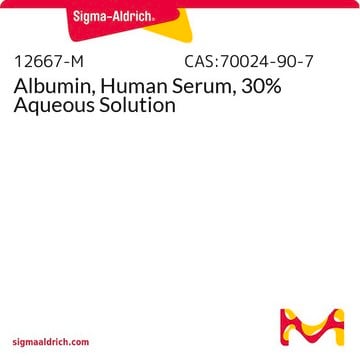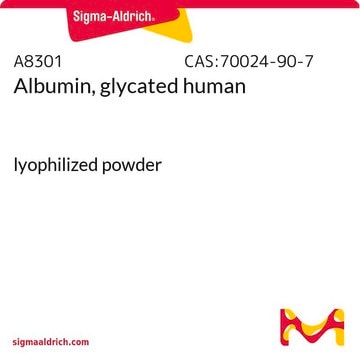A6608
Albumin human
recombinant, expressed in Saccharomyces cerevisiae, aqueous solution, 10% in aqueous buffer, ≥99% (agarose gel electrophoresis)
Synonym(s):
rHSA
About This Item
Recommended Products
biological source
human
recombinant
expressed in Saccharomyces cerevisiae
Assay
≥99% (agarose gel electrophoresis)
form
aqueous solution
mol wt
monomer ~67 kDa
concentration
10% in aqueous buffer
technique(s)
cell culture | mammalian: suitable
UniProt accession no.
storage temp.
2-8°C
InChI
1S/C3F8/c4-1(5,2(6,7)8)3(9,10)11
InChI key
QYSGYZVSCZSLHT-UHFFFAOYSA-N
Gene Information
human ... ALB(213)
Looking for similar products? Visit Product Comparison Guide
General description
Application
- to study its adsorption process on model mica surface at pH 3.5 using the atomic force microscopy (AFM) and in situ streaming potential measurements
- to study its proteolytic activities under reducing conditions
- in the medium for stem cell cultivation
Biochem/physiol Actions
Analysis Note
Other Notes
Storage Class Code
10 - Combustible liquids
WGK
WGK 3
Flash Point(F)
Not applicable
Flash Point(C)
Not applicable
Certificates of Analysis (COA)
Search for Certificates of Analysis (COA) by entering the products Lot/Batch Number. Lot and Batch Numbers can be found on a product’s label following the words ‘Lot’ or ‘Batch’.
Already Own This Product?
Find documentation for the products that you have recently purchased in the Document Library.
Customers Also Viewed
Our team of scientists has experience in all areas of research including Life Science, Material Science, Chemical Synthesis, Chromatography, Analytical and many others.
Contact Technical Service


